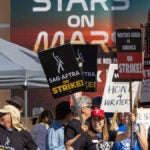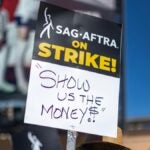Actors and writers tell TheWrap their stories of hope, stress and rage towards the studios and Disney CEO Bob Iger
As they step off the bus, a chant of “Jig is up!” fills the air, invoking a phrase from Drescher’s impassioned speech Thursday, decrying Hollywood executives like Disney CEO Bob Iger and which has been seen by dozens of SAG-AFTRA members who spoke with TheWrap on Friday at picket lines in both New York and Los Angeles.
The members say that the veteran actress and organizer’s speech spoke directly to their experience as working class actors, finding it increasingly harder to make ends meet from a profession they pour their passion into for the profit of multibillion dollar studios and who they see as trying to render them obsolete through artificial intelligence.
“I am Gen X and I never imagined that I would be radicalized,” said Heather Dowling, a seven-year member of SAG-AFTRA who says she hadn’t been seriously involved with her union until the Writers Guild of America went on strike two months ago, when she learned that a fellow actor she had great respect for and who worked on up to 24 productions a year didn’t make enough to qualify for SAG-AFTRA’s health plan.
“I never believed I would find myself on a picket line. That was not on my life bingo card,” Dowling said. “Watching this mess has just emboldened me to say, ‘We have to stand up and speak up for people,’ and I mean people not just actors… standing up for working people that are just trying to make a living doing what they’re good at.”
At picket lines across both cities, the atmosphere among writers and actors was a mix of motivated optimism and deep anger towards Hollywood’s C-suite, particularly its most prominent CEOs. When the picket lines began at 9 a.m. at the Sony Pictures lot in Culver City, WGA members took to picketing at the lot’s western entrance while SAG-AFTRA members took up the main gate on the east side, with the two unions gradually mingling as more picketers trickled in.
“We didn’t even have this east gate picketed earlier this week,” said WGA strike captain Eli Edelson, who spoke to TheWrap earlier this week. “This is definitely a morale booster for our members here on this line, and we are going to be right there supporting our SAG brothers and sisters for however long it takes to get a deal.”
“There’s a lot of common ground and a lot of similarity with the response to our asks… where [SAG-AFTRA] asks weren’t even given proper consideration, where they weren’t even showing any daylight, and that is what we saw in negotiations as well,” WGA assistant general counsel Kathy Christovich added from the Fox picket line. “It does come down to wages, residuals, AI — that’s common language of our collective bargaining agreements and we’re seeking, in a lot of ways, the same protection.”
But while a few dozen writers and actors dotted the entrances to the Sony, Fox and Universal lots, the sidewalks surrounding the headquarters of Netflix, Warner Bros. and especially Disney were filled with hundreds of picket signs from both unions.
Netflix has become a major target of frustration for WGA and SAG-AFTRA as the impacts of streaming on wages, writers rooms and residuals have become key sticking points that have led to this double strike. David Zaslav’s tumultuous year as CEO of Warner Bros. Discovery has also earned him the ire of Hollywood labor going back to day 1 of the WGA strike, when WGA board member Adam Conover called him out during a CNN interview.
And then there is Bob Iger, who during a CNBC interview said that when it came to the WGA and SAG-AFTRA contract proposals, “there’s a level of expectation that they have that is just not realistic, and they are adding to the set of the challenges that this business is already facing that is, quite frankly, very disruptive.”
The picket signs surrounding the Disney lot pounced on Iger’s comments, with messages like “We made you a billionaire, Bob” and “Hey Bob: Power doesn’t panic,” a reference to the Disney+ “Star Wars” show “Andor,” which earned eight Emmy nominations this week.
“For him to have the nerve to say that our asks are unreasonable and what the writers are asking is unreasonable when we know the salaries of these CEOs… I’m telling you it was like pouring gasoline on a fire,” Dowling said.
Beyond Iger, other quotes from studio executives — especially those circulated within a recent article that reported the endgame of the AMPTP was to let writers start losing their apartments and houses — fueled a distaste among those on the picket line who are fighting just to make ends meet.
“That’s horrendous. That is vile,” seethed Sue Birch, a SAG-AFTRA strike captain at the picket line in front of Netflix’s Manhattan offices. “That’s the first thing I have to say. The second thing I have to say is that writers and actors are used to being out of work. When we work, we put our money aside because we know that this might be our only job this year. They tried this with us on the commercial strike in 2000, it was a six-month strike. We stuck it out.
“I just want to wake up tomorrow and feel secure — I don’t want to have to worry,” SAG member B.K. Phillips said, adding that he must continue to put money into training for when the strike ends. “It doesn’t seem to be fair where the wages for people in my tier of acting keeps getting cut each year, but these executives are walking away with contracts and deals… if some of that money was returned into the product maybe the product would be fantastic and everyone would come out a winner.”
Beyond their bottom line, artificial intelligence was another issue that SAG-AFTRA members railed against, as multiple actors who spoke to TheWrap referenced chief negotiator Duncan Crabtree-Ireland’s statement at Thursday’s press conference that the Alliance of Motion Picture and Television Producers’ proposal would allow studios to use AI recreations of a background actor in perpetuity for only one day’s pay.
The AMPTP says that this is false, claiming that its proposal would only allow for digital recreations for the project that the actor is employed on and that use of such digital recreations in other projects would only be done with the actor’s consent and with compensation.
While more information on the two sides’ proposals on AI and other sticking points is still forthcoming, actors say that they are glad that their union is doing everything in its power to fight against AI at its earliest stages of adoption by studios.
“AI can give you words, it can give you scenes, but it can never give you heart and soul — that is only gonna come from creators,” SAG-AFTRA member Oral Forrest Jr. said at the Fox lot. “That can only be fully executed by actors, real actors, real people, who have real lived experiences that we want to share with people.”
“What we’re facing right now with AI is something that every profession is going to face,” added voiceover actor Clay Savage from the Sony pickets. “AI is only going to become more efficient as the years go on, and what CEOs in Hollywood are trying now will be tried by CEOs of other businesses. It can be a useful tool, but if we all don’t make a stand now, it will replace us.”
Savage’s words were echoed by several other WGA and SAG-AFTRA members on Friday, as well as Drescher herself in the speech that got rave reviews from her fellow actors on the picket lines.
It was a potentially career-defining moment for Drescher, who was elected SAG-AFTRA president in 2021 after a heated union election that saw her Unite for Strength caucus and the opposing Membership First sling attacks at each other. Drescher would later polarize the SAG-AFTRA membership with comments she made opposing mandates for COVID-19 vaccines on productions as Hollywood emerged from the pandemic.
But all of that seemed distant after Drescher’s speech, in which she set the record straight about her presence at a contractual brand shoot for Dolce & Gabbana in Italy with Kim Kardashian a week ago, saying that she didn’t neglect her duties as guild president and remained in videoconference contact with her negotiating team as the contract deadline approached with no progress on a deal being made.
“At 10:30 p.m. at night, I would leave the event. I would go to my hotel room and I call into the Zoom. And when I couldn’t get through to them because I was on a plane, I was texting with them constantly throughout the plane ride,” Drescher said on Thursday. “I worked around the clock in three different time zones because my parents live in Florida, so I keep asking them to move here, and I manage their well-being as well. So you know I think that all of the people standing behind me stand behind me.”
Shari Belafonte, a member of the SAG-AFTRA negotiating committee, had nothing but praise for how Drescher led her team during talks with the AMPTP, and says that she thinks the studios underestimated her.
“From the beginning, she’s been the little pit bull, and I think there were people who thought, ‘Oh, she’s The Nanny, she’s going to be a pushover,” she said. “She was always in contact with us. We’d be here in the afternoon, she’d be talking with us after midnight.”
Drescher’s passion may have gotten Hollywood’s double strike off with a bang, but a rough road lies ahead. On top of the financial and emotional strain that comes with a strike, the immense summer heat waves gripping the United States and much of the northern hemisphere will likely persist for much of the next two months. Both the WGA and SAG-AFTRA’s captains were seen unloading extra coolers full of water while picketers regularly took breaks in shaded areas to cool off.
“I hope the studios come to their senses and realize that nobody needs to do this. We’d rather be working under a fair deal making shows in a room with AC,” Belafonte said. “But I think people are going to keep coming out here. We’ll bring the tents, we’ll bring the ice and the water and we’ll stay out here until we get what we need from the studios.”
Source link





